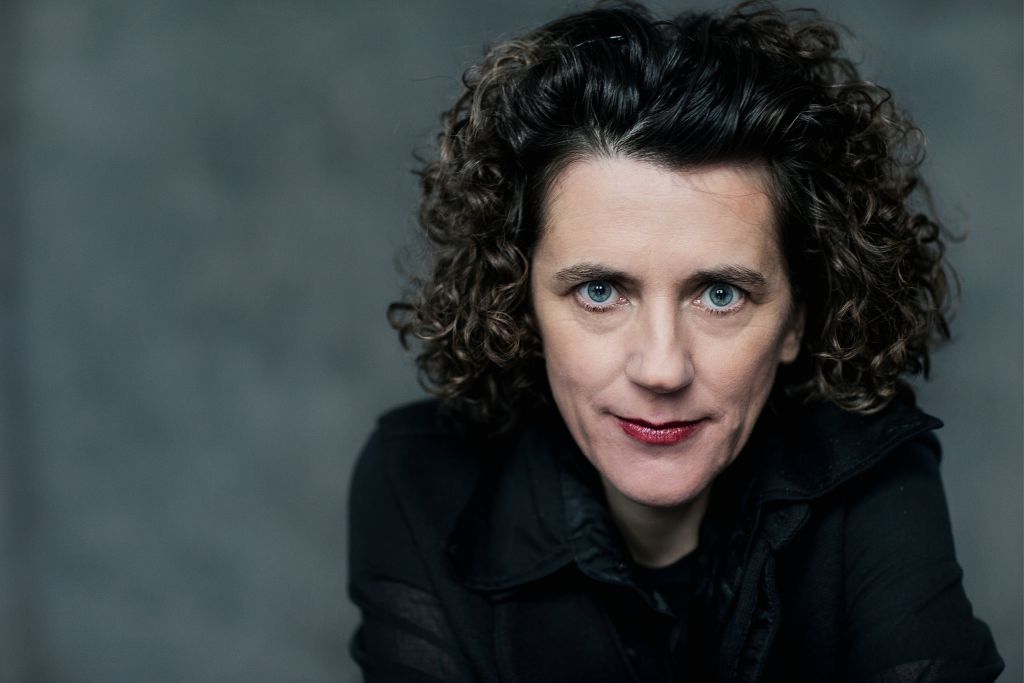Olga Neuwirth, you were long viewed as a provocateur. Though one might reflect on how that word’s Latin root, “provocare”, really means nothing more than “to call (something) forth”. So in this vein, what all have you called forth over the course of your career so far?
Olga Neuwirth (ON): It really is the case—especially when you’re a woman and have always been so brash as to express yourself freely—that people go and attach some stereotype to you. And for me, it was that of the provocateur. Which doesn’t interest me in the slightest; what does interest me, however, is indeed precisely this “calling forth”, this questioning of norms that human beings have established in order to achieve something that really every human being wants: to go from being other-determined to being free, from ritualism to freedom of choice. So for me, it’s about calling forth a willingness to change and the ability to still somehow develop visions. And especially in a world that seeks to have things function more and more in lockstep, including in the arts, it’s about daring to think differently, to put new twists on old thoughts when reality has grown old and grumpy. When the world’s leaves have fallen off…
And what most provokes you, these days?
ON: Anticipatory obedience—this urge to conform to existing norms, in art and in life. And people being intolerant while going on and on about how tolerant they are. It’s a kind of cynicism that I find hard to bear.

Even today, the topic of gender justice is anything but settled. And one sense in which you’re considered a pioneer is in terms of how you’ve played your role as a woman who composes. Young colleagues today are surely in the fortunate place of having a somewhat easier time gaining acceptance. What’s changed since back when you began?
ON: That issue’s by no means settled, no, but many things have improved for young women composers. Back when I was studying and beginning my career, it was more or less still the Middle Ages in terms of how composing women were treated, a situation that would be unimaginable today. It really was a laborious daily exercise in “glass-breaking”.
What significance did your studies at the mdw with Erich Urbanner and at the Institute of Electroacoustics and Experimental Music have to you?
ON: I’d rather not talk about that. What I will say is: since the truly contemporary developments in Austria back then weren’t enough to satisfy my interests after I’d returned from studying at the San Francisco Conservatory of Music, I went privately once a month to Adriana Hölszky in Stuttgart while I was studying in Vienna. From her, I got to know the diversity of compositional techniques that existed and got to study scores in a way that was without value judgements and unbelievably open.
What would you recommend to students at the mdw or to young people who want to compose or study composition nowadays?
ON: Absorb everything you’re offered, and be curious and open so that you can find yourself and arrive at your own forms of self-expression. And by no means should you get discouraged when learning to articulate your own qualities; instead, work constantly to strengthen your own individual will.
After a long struggle, your work Orlando (commissioned by the Vienna State Opera) was finally premièred—to great success— in December 2019. How would you assess this production overall, in hindsight?
ON: Well, all five of the performances sold out (and it’s shame there were only five after such great effort on everyone’s part), and the production generated stunning international resonance. But in truth, its assessment and all other such things are now in the hands of others: the decision-makers in the music world, the directors, the publisher, the festival heads. I have absolutely no way of influencing that. So I’m just happy and grateful that it did at least get realised largely in accordance with my musical and theatrical vision of the entire thing, which I’d developed over many years. And I’m also happy that I had some very important allies like Comme des Garçons, a supportive dramaturge, great singers and actors, a wonderful conductor, and wonderful sound engineers with whom I’ve been working for years.
Personal details
Olga Neuwirth was born in Graz in 1968. She began taking trumpet lessons at age seven but had to give up playing later on due to an accident. In 1986, she went to San Francisco and enrolled at the Conservatory of Music as well as at the Academy of Art College, where she studied painting and film. She eventually transferred to the mdw. Neuwirth gleaned important impulses from her experiences with Adriana Hölszky, Tristan Murail, and Luigi Nono, and she first became internationally known in 1991 for her two mini-operas after texts by Elfriede Jelinek. 1998 saw her invited to the Salzburg Festival as a guest of its “Next Generation” series, and 1999 witnessed the première of her full-length music theatre work Bählamms Fest—likewise after a text by Jelinek. Further important works for the stage include Lost Highway after David Lynch’s synonymous film (2003), The Outcast after the life and works of Herman Melville (2012), American Lulu (also 2012), and her most recent opera Orlando after the novel by Virginia Woolf, which premièred at the Vienna State Opera in 2019. Neuwirth has been the recipient of numerous Austrian and international awards including the Grand Austrian State Prize (2010).

